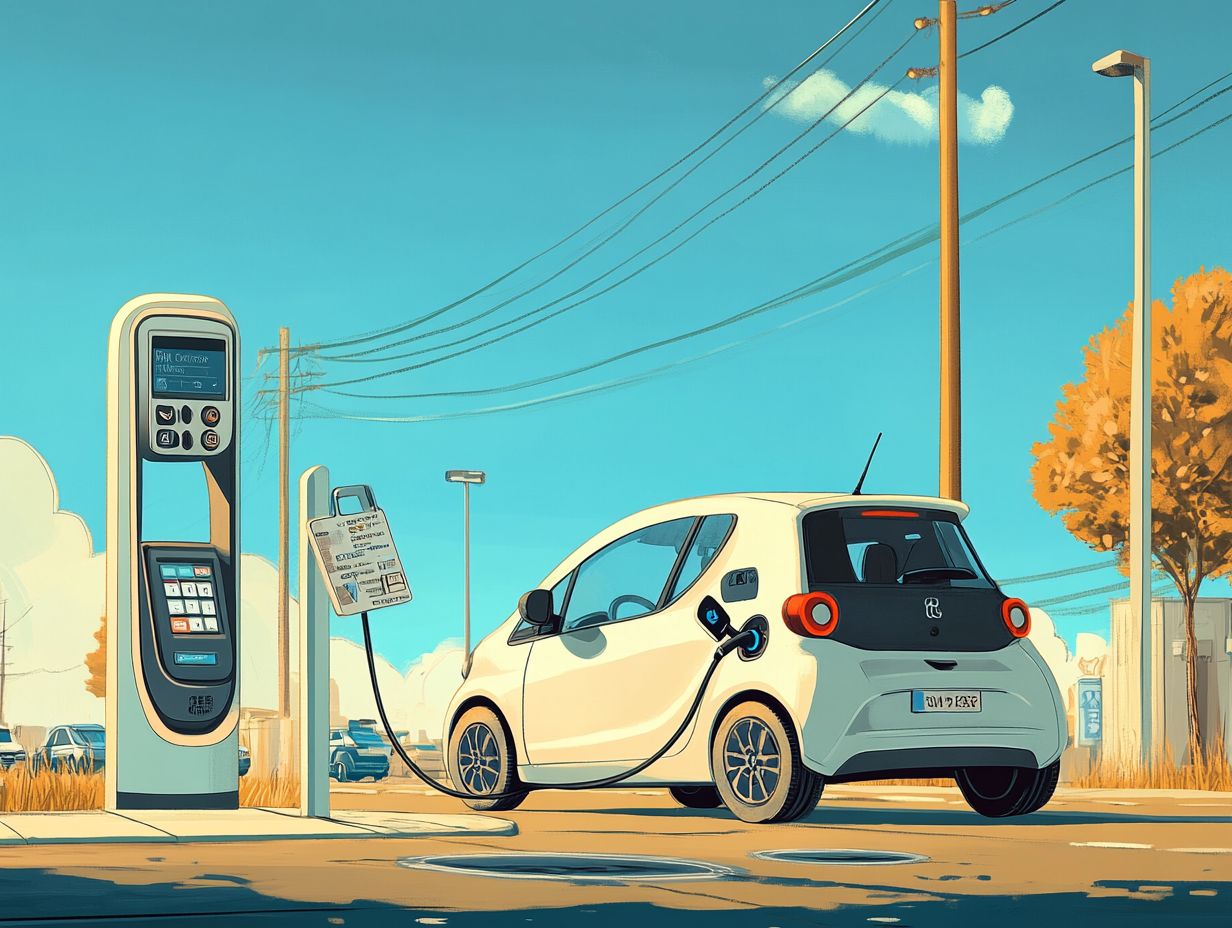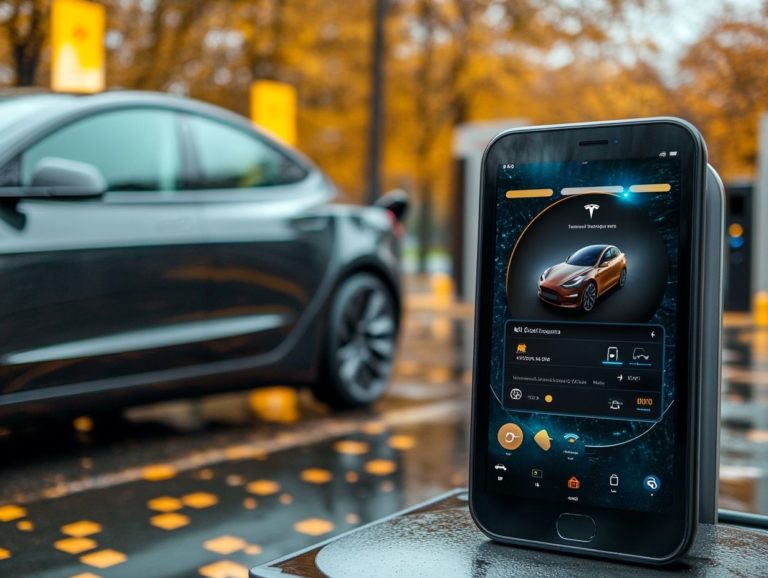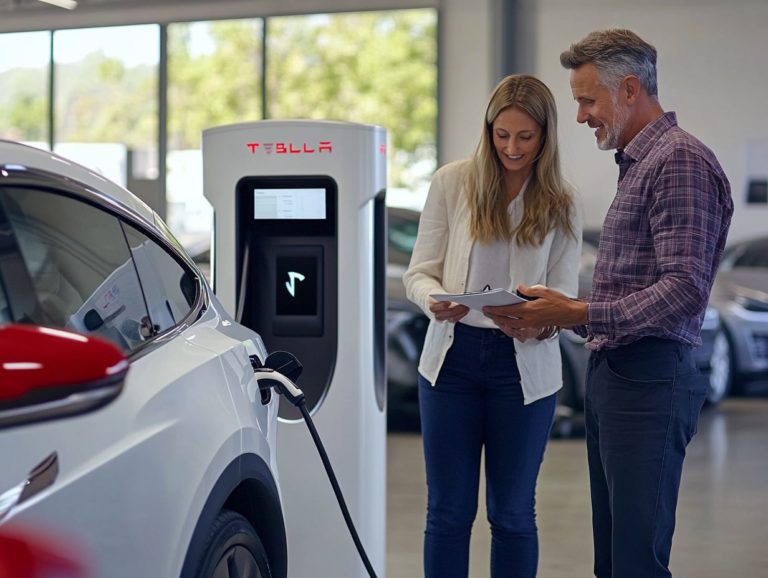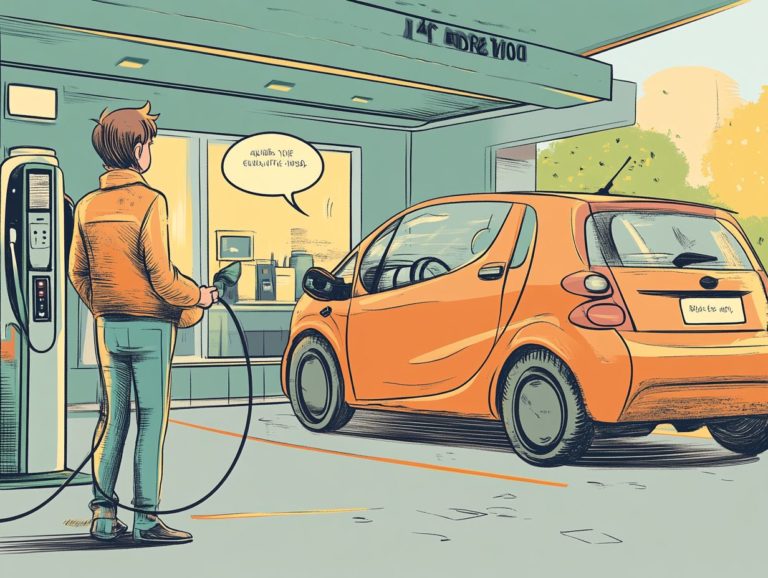what is the average cost of an electric vehicle?
Electric vehicles (EVs) are rapidly gaining traction among eco-conscious drivers eager to cut down on fuel expenses.
To make an informed decision, it s essential to understand the factors that influence their pricing. Every detail matters from battery size and technology to performance and additional features. Each of these elements plays a pivotal role in determining the overall cost.
This guide will walk you through the average prices of electric vehicles, draw comparisons with conventional options, and unveil savvy strategies to maximize your investment. Whether you re contemplating a purchase or simply curious about the market, this information will equip you with valuable insights into the evolving world of electric vehicles.
Contents
- Key Takeaways:
- Factors Affecting the Cost of Electric Vehicles
- Average Cost of Electric Vehicles
- Ways to Save on Electric Vehicle Costs
- Long-Term Savings on Fuel and Maintenance
- Frequently Asked Questions
- What is the average cost of an electric vehicle?
- Are electric vehicles more expensive than traditional gas-powered vehicles?
- What factors affect the cost of an electric vehicle?
- Are there any government incentives or tax credits for purchasing an electric vehicle?
- Is there a significant price difference between fully electric and hybrid electric vehicles?
- Do electric vehicles have lower long-term costs compared to gas-powered vehicles?
Key Takeaways:

- The cost of an electric vehicle depends on factors like battery size, range, and features.
- Average costs of EVs are currently higher than conventional cars but are expected to drop as technology improves.
- Save on costs through tax incentives, rebates, or leasing options.
What are Electric Vehicles?
Electric vehicles (EVs) represent a transformative era in transportation, utilizing electric power rather than traditional gasoline. As you explore popular models like the Tesla Model Y, Chevrolet Bolt, and Hyundai Ioniq 6, you’ll find that these vehicles play a crucial role in enhancing air quality by significantly reducing emissions.
With the rising demand for greener alternatives, manufacturers are in a relentless pursuit of innovation to improve efficiency ratings and overall performance. The essence of electric vehicles extends well beyond mere convenience; they are pivotal in creating a more sustainable future.
As you adopt new charging habits, you can seamlessly transition away from fossil fuel dependency, resulting in a marked decrease in greenhouse gas emissions. This shift not only aids the environment but also enriches air quality in urban settings, making cities much more livable.
With exciting new models emerging, such as the Ford Mustang Mach-E and Nissan Leaf, the market is becoming increasingly diverse, catering to a wide array of consumer preferences. This burgeoning competition among manufacturers propels advancements that ultimately make electric vehicles more accessible and efficient for everyone.
Factors Affecting the Cost of Electric Vehicles
The cost of electric vehicles is shaped by several key factors, such as battery size and type, charging costs, and maintenance costs. Understanding these elements is key for buyers, as they can significantly influence the overall cost of ownership.
EV incentives offered by local and federal governments can play a pivotal role in your financial considerations when it comes to owning an electric vehicle. Act fast to take advantage of available tax breaks before they change!
Battery Size and Type
Battery size and type are crucial factors that directly impact the performance and efficiency of electric vehicles, like the Tesla Model 3. These elements influence everything from range to how often you charge, making them essential considerations in your EV experience.
Different battery types, such as lithium-ion and solid-state, come with their unique advantages, affecting efficiency ratings and even the availability of charging stations.
For instance, opting for a larger battery pack typically translates to longer driving ranges, allowing you to cover greater distances on a single charge. This is particularly attractive for those who rely on electric vehicles for daily commutes or adventurous road trips.
On the flip side, smaller batteries can improve the car’s agility and responsiveness, especially in urban environments where frequent stops and starts are the norm.
Advancements in battery technology, including fast-charging capabilities and enhanced thermal management systems, are reshaping choices and preferences among drivers. As manufacturers continue to innovate, the market is evolving, revealing findings that highlight increased efficiency and performance.
This evolution positions electric vehicles not only as a practical choice but also as an exciting one, ready to elevate your driving experience.
Continue your journey to find the perfect EV for you!
Range and Performance
The range and performance of electric vehicles, like the Hyundai Ioniq 6, are essential for your adoption and satisfaction as a consumer. Considerations such as your charging habits, the vehicle’s weight, and its aerodynamics can significantly influence how far an EV can travel on a single charge. This ultimately affects fuel costs when compared to gas vehicles.
While many gas vehicles typically offer a range of around 300 miles per tank, the latest electric models have begun to meet or even surpass this standard. Some can deliver over 400 miles on a single charge, easing range anxiety a major hurdle for many when it comes to embracing EVs. Did you know that nearly 80% of EV charging happens at home? This highlights the critical need for effective charging infrastructure!
Electric vehicles impress with rapid acceleration and responsive handling qualities that resonate with consumers seeking both efficiency and excitement behind the wheel. These advancements signal a promising trend, showing that the gap between traditional gas vehicles and electric options is narrowing at an impressive pace.
Additional Features and Technology

Modern electric vehicles, such as the Tesla Model Y and Chevrolet Bolt, are packed with advanced technology and features that elevate your driving experience while maximizing energy savings. From regenerative braking systems to cutting-edge infotainment setups, every aspect is crafted for efficiency and functionality.
State-of-the-art battery management systems play an important part in optimizing power usage, allowing you to achieve longer ranges on a single charge compared to traditional gas vehicles. You’ll appreciate the smartphone integration that lets you control various aspects of your vehicle remotely like pre-conditioning the cabin temperature or checking battery levels.
Models like the Ford Mustang Mach-E and Nissan Leaf take these innovations further, offering enhanced connectivity and autonomous driving capabilities that redefine convenience on the road. Electric vehicles are not merely a greener option; they signify a significant leap toward smarter, more efficient transportation.
Average Cost of Electric Vehicles
The average cost of electric vehicles is a crucial consideration for you as a potential buyer. Current market prices often reflect the initial investment compared to gasoline vehicles. According to Cox Automotive, elements like model popularity and specific features can significantly impact prices.
Don t miss out on exploring a range of options to uncover the best value for your investment!
Current Market Prices
Current market prices for electric vehicles like the Tesla Model 3, Nissan Leaf, and Chevrolet Bolt fluctuate based on demand and regional factors. You should delve into comprehensive research on market trends and explore potential discounts or incentives to ensure your purchase is informed and advantageous.
Factors driving price variations include production costs, raw material availability, and government regulations. The popularity of specific models can also trigger price adjustments; when demand rises, costs often do too.
Various incentives provided by local and federal governments significantly shape your purchasing decisions. These incentives can reduce upfront expenses, making electric vehicles even more enticing. By staying informed about these elements, you can navigate the ever-evolving landscape and select a model that perfectly aligns with your needs and budget.
Comparison to Conventional Vehicles
When you compare electric vehicles to conventional ones, it’s essential to consider factors like charging costs, fuel expenses, and the long-term benefits of reduced emissions. While the upfront price of electric vehicles might be steeper, the ongoing savings from lower fuel and maintenance costs can quickly turn them into a financially sound choice.
The environmental advantages of electric vehicles add significantly to their appeal. Conventional vehicles tend to emit higher levels of greenhouse gases, worsening climate change and air pollution. In contrast, electric vehicles offer a cleaner alternative, especially when powered by renewable energy sources.
The potential for long-term savings, combined with government incentives to purchase electric vehicles, makes them attractive for individuals and businesses aiming to reduce their carbon footprint. In this ever-evolving landscape, understanding the total cost of ownership is vital for making informed decisions.
Ways to Save on Electric Vehicle Costs
You have various options to save on electric vehicle costs, such as leveraging tax breaks, exploring leasing options, and making smart buying decisions.
Many governments provide enticing tax breaks that encourage people to buy electric cars, ultimately making the transition more financially feasible.
This approach not only eases the initial investment but also helps you estimate future savings, ensuring a smarter financial move in the long run.
Tax Incentives and Rebates

Tax breaks like the EV Tax Credit from the Inflation Reduction Act can significantly reduce the upfront costs of electric vehicles, making them much more attractive for you as a consumer. The U.S. Department of Treasury provides clear guidelines on eligibility and the application process for these incentives.
You can also benefit from state-level programs that offer additional rebates or tax credits, further easing your financial burden. Some states provide cash rebates for purchasing zero-emission vehicles, while others may offer reduced sales tax or exemptions from registration fees.
These amazing financial breaks can save you a ton of money! They not only help you cut down on overall expenses but also play a crucial role in boosting the adoption of electric vehicles. As demand for EVs continues to rise, these incentives contribute significantly to creating a more sustainable automotive industry, promoting greener transportation options, and ultimately reducing your carbon footprint.
Leasing vs. Buying
Think carefully about whether to lease or buy an electric vehicle. You ll want to evaluate important factors such as initial costs, ongoing maintenance expenses, and potential fuel savings.
Each option has its advantages and disadvantages, so it’s crucial to assess your unique situation. Leasing often offers lower monthly payments and access to the latest technology, making it an appealing choice for those who enjoy frequent upgrades.
However, leasing typically imposes mileage limits, which could complicate things for long-distance commuters. Conversely, purchasing an electric vehicle may be the more economical choice over time, especially if you plan to keep it for several years.
As an owner, you could also benefit from advancements in battery technology, which refer to improvements that enhance the efficiency and longevity of electric vehicle batteries, potentially increasing your vehicle’s resale value.
Ultimately, understanding these financial implications and maintenance responsibilities will enable you to make a well-informed decision that aligns seamlessly with your lifestyle and budget.
Act now to take advantage of these savings while they last!
Long-Term Savings on Fuel and Maintenance
Long-term savings on fuel and maintenance are some of the most compelling reasons to consider an electric vehicle. Over time, EVs often come with significantly lower costs compared to gasoline vehicles.
With impressive efficiency ratings, electric vehicles contribute to a greener planet and lead to meaningful savings in operational expenses. Studies reveal that you could save an average of $1,000 to $1,500 annually on fuel costs alone due to lower electricity prices compared to gasoline.
Your maintenance expenses will also decrease. Electric vehicles have fewer moving parts, eliminating the need for oil changes and reducing wear on brake systems with a system that helps recharge the battery while you drive.
Over the lifespan of your vehicle, these total savings can add up to tens of thousands of dollars. This makes electric vehicles not just a choice for sustainability but also a financially wise decision.
Frequently Asked Questions
What is the average cost of an electric vehicle?
The average cost of an electric vehicle (EV) varies depending on the model, brand, and features. On average, EVs range from $30,000 to $70,000, while their performance can also be influenced by factors like the range of popular electric vehicles.
Are electric vehicles more expensive than traditional gas-powered vehicles?

Electric vehicles generally tend to be more expensive than traditional gas-powered vehicles. However, EVs have lower maintenance and fuel costs, which can offset the initial price.
What factors affect the cost of an electric vehicle?
The cost of an electric vehicle can be influenced by several factors, such as battery size, range, and features. The more advanced and high-performing the EV, the higher the cost will likely be.
Are there any government incentives or tax credits for purchasing an electric vehicle?
Yes, many governments offer incentives and tax credits to encourage the purchase of electric vehicles. These incentives can significantly reduce the cost of an EV, making it a more affordable option.
Is there a significant price difference between fully electric and hybrid electric vehicles?
Yes, fully electric vehicles tend to be more expensive than hybrid electric vehicles. Fully electric vehicles rely solely on battery power, while hybrid vehicles also have a traditional gasoline engine.
Do electric vehicles have lower long-term costs compared to gas-powered vehicles?
Yes, electric vehicles have lower long-term costs compared to gas-powered vehicles. With fewer moving parts, EVs require less maintenance and repair. Electricity costs much less than gasoline, resulting in lower fuel expenses.






